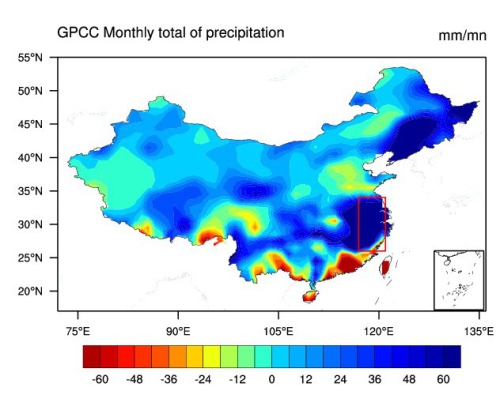In May 2016, an extreme rainfall occurred in the lower reaches of the Yangtze River Valley. The area averaged anomaly of total precipitation over the region (117°–121°E, 26°–34°N) was the third wettest on record since 1961. There were 25 stations broke 56-year maximum records. Meanwhile, the 2015–16 El Niño event was regarded as one of the strongest El Niño events in recorded history, bringing heavy rains and drought to different parts of world. After such a super El Niño event, what causes such precipitation extremes – the anthropogenic forcing or natural variability? And what are the changes in the risk?

Monthly precipitation anomaly (mm/mn) over China in May 2016
To answer these questions, Drs. LI Chunxiang and XIA Jiangjiang from Institute of Atmospheric Physics, Chinese Academy of Sciences, collaborated with the scientists from China Meteorological Administration, Met Office Hadley Centre of UK, University of Reading and University of Edinburgh and used the “Risk Ratio” (RR), a probabilistic extreme event attribution approach, to characterize the anthropogenic contribution to the occurrence of the extreme event.
"There is a significant increase in May 2016 rainfall in model simulations relative to the climatological period, but this increase is largely attributable to natural variability. And the strong El Niño of 2015–16 may account for the extreme precipitation event in 2016". Says LI Chunxiang, the first author of this study . "However, on smaller spatial scales we find that anthropogenic forcing has likely played a role in increasing the risk of extreme rainfall to the north of the Yangtze and decreasing it to the south".
The study has just been published in Environ. Res. Lett.
Reference: Li, C., Q. Tian, R. Yu, B. Zhou, J. Xia, C. Burke, B. Dong, S. Tett, N. Freychet, F. Lott, A. Ciavarella, 2017: Attribution of extreme precipitation in the lower reaches of Yangtze River during May 2016. Environ. Res. Lett., doi:10.1088/1748-9326/aa9691. http://iopscience.iop.org/article/10.1088/1748-9326/aa9691
Media contact: LIN Zheng, jennylin@mail.iap.ac.cn
